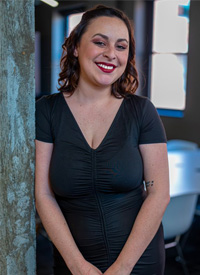In honor of Labor Day, Gabrielle Sanchez-Steenberger, communications associate, shares her recent experiences with community organizing among fellow graduate students to create more equity in higher education.
I imagine March 2020 will forever exist as one of those moments snapshotted in time—a point of reference easily summoned at cocktail parties or high school reunions, prompting each individual in turn to recite their story; where they were when lockdown began—what they were doing and how they reacted. As we navigate time and space, we are constantly seeking points of reference to try to relate to one another; it is human nature. Amidst chaos and tragedy, we find a strange comfort in the collective experiences we all share. The 9/11 attacks. The Space Shuttle Challenger explosion. The assassinations of Dr. Martin Luther King Jr. and President John F. Kennedy. In times of uncertainty, our nature is to turn to our neighbors and friends and rely on community for comfort and support.
In March 2020, I was a recent college graduate standing at the threshold of a new chapter, anticipating what my life and career might be. The small business I worked for was in danger of being lost to the wave of the economic devastation of the pandemic. Costs had to be cut to stay afloat, and I—like so many others—was laid off. In the year following, I was steadily applying for any job opportunity I could find, and I also applied to grad school. I received an admittance letter from a graduate program at Indiana University and an offer letter from CICF within the same week. I could not turn down either opportunity. I began attending classes while working a traditional nine-to-five job and fulfilling my duties as a graduate assistant and associate instructor, a common role for graduate students.
If you attended college, you might recall how many of your courses were not taught by an actual professor but by a graduate student.
Graduate workers, simply put, are the invisible backbone of any university. Teaching courses independently and assisting faculty in their work is a common aspect of graduate education. If you attended college, you might recall how many of your courses were not taught by an actual professor but by a graduate student. These graduate workers are often awarded a stipend for their work to cover living expenses while they pursue their degree. This stipend, however, is rarely enough to even approach the cost of living, and many find themselves struggling to meet their basic needs. Some graduate workers attempt to live on less than $10,000 a year—around $830 per month before taxes. Graduate workers perform duties vital to the operation of educational institutions, and it is unreasonable and exploitative that they should not receive a living wage. Due to these concerns, the Indiana University Graduate Workers Coalition of more than 2,500 graduate workers was born and began to organize. I proudly joined them.
Throughout the fall and spring of this past year, I stood with my fellow graduate workers in solidarity as we participated in a strike for union recognition. As it stands, pursuing higher education requires such great sacrifice that many people—especially Black or Brown would-be students—are barred from participating. I have been incredibly blessed that my position here at CICF has been so accommodating and flexible as I pursue my advanced degree. I recognize this is rare. Many of my peers sacrifice basic needs in the pursuit of education. I cannot imagine the state of my financial and mental well-being attempting to live in the confines of graduate employment alone. Education is a human right that should be encouraged and prioritized, not limited to only those willing to suffer for it. The rigorous studies associated with graduate education should not be overshadowed by the fight to meet one’s basic needs.
My time at CICF has overlapped with the racial reckoning of the recent years. Working for an organization committed to advancing equity in our community through philanthropy is difficult and emotionally laborious work. Each day, we dedicate ourselves to the betterment of our community, and each day we are met with new challenges. These recent years have brought many together as we relied on the support and agency of our communities, while also illuminating racial and social divides—and our need for radical change as a nation. I see my own experience as a scatter chart pinned to a corkboard, yarn connecting one pin of new understanding to another. The common hardships among my graduate peers are not unlike so many other inequities we are working to solve as a society. “Equitable opportunity to reach one’s full potential—no matter race, place, or opportunity” is a phrase that has lived at the forefront of my mind these past years—not only as CICF’s mission—but as a point of reference, a core value to continually return to.
This past summer, Indiana University recognized the demands of the Graduate Student Worker’s Coalition, increasing our salaries, eliminating fees, and improving the living and working conditions of thousands of graduate students. While we continue to fight for union recognition and representation, this is an incredible first step. This Labor Day, let us remember that collective action is powerful, and that we can recognize the vast inequities that exist in our society and choose to challenge and reconstruct them. We all have a story, a snapshot in our minds from March 15, 2020, and the constant and alarming examples of injustice and inequity that have surfaced since the initial lockdown. Our society as we knew it shut down, and the stark and distressing racial, economic and legislative inequities became glaringly obvious to those fortunate enough to be previously unaware. With open eyes, we have a unique opportunity for both radical and sustainable change. If we can turn the collective experience of inequity—in all its forms—into collective action, we have the ability to create a society that serves, values and respects all—no matter place, race or identity.







Leave A Comment